ENGLISH HOME LANGUAGE PAPER 2 GRADE 12 QUESTIONS- AMENDED SENIOR CERTIFICATE EXAM AND PAST PAPERS MAY/JUNE 2016
Share via Whatsapp Join our WhatsApp Group Join our Telegram GroupENGLISH HOME LANGUAGE PAPER 2
SENIOR CERTIFICATE EXAMINATIONS
GRADE 12
2016
INSTRUCTIONS AND INFORMATION
- Read this page carefully before you begin to answer the questions.
- Do not attempt to read the entire question paper. Consult the table of contents on page 4 and mark the numbers of the questions set on texts you have studied. Thereafter, read these questions and choose the ones you wish to answer.
- This question paper consists of THREE sections:
SECTION A: Poetry (30 marks)
SECTION B: Novel (25 marks)
SECTION C: Drama (25 marks) - Answer FIVE QUESTIONS in all: THREE in SECTION A, ONE in SECTION B and ONE in SECTION C as follows:
SECTION A: POETRY
PRESCRIBED POETRY – Answer TWO questions.
UNSEEN POETRY – COMPULSORY question
SECTION B: NOVEL
Answer ONE question.
SECTION C: DRAMA
Answer ONE question. - CHOICE OF ANSWERS FOR SECTIONS B (NOVEL) AND C (DRAMA):
- Answer questions ONLY on the novel and the drama you have studied.
- Answer ONE essay question and ONE contextual question. If you answer the essay question in SECTION B, you must answer the contextual question in SECTION C.
If you answer the contextual question in SECTION B, you must answer the essay question in SECTION C.
Use the checklist to assist you.
- LENGTH OF ANSWERS:
- The essay question on Poetry should be answered in about 250–300 words.
- Essay questions on the Novel and Drama sections should be answered in 400–450 words.
- The length of answers to contextual questions should be determined by the mark allocation. Candidates should aim for conciseness and relevance.
- Follow the instructions at the beginning of each section carefully.
- Number your answers correctly according to the numbering system used in this question paper.
- Start EACH section on a NEW page.
- Suggested time management:
SECTION A: approximately 40 minutes
SECTION B: approximately 55 minutes
SECTION C: approximately 55 minutes - Write neatly and legibly.
TABLE OF CONTENTS
| SECTION A: POETRY Prescribed Poetry: Answer ANY TWO questions. | |||
| QUESTION NO. | QUESTION | MARKS | PAGE NO. |
| 1. 'In Detention' | Essay question | 10 | 6 |
| 2. 'An Abandoned Bundle' | Contextual question | 10 | 7 |
| 3. 'When I have fears that I may cease to be' | Contextual question | 10 | 8 |
| 4. 'On the Move' | Contextual question | 10 | 9 |
| AND Unseen Poetry: COMPULSORY question | |||
| 5. 'Riding in the New York Subway' | Contextual question | 10 | 11 |
| SECTION B: NOVEL Answer ONE question.* | |||
| 6. Animal Farm | Essay question | 25 | 12 |
| 7. Animal Farm | Contextual question | 25 | 12 |
| 8. Pride and Prejudice | Essay question | 25 | 14 |
| 9. Pride and Prejudice | Contextual question | 25 | 15 |
| 10. The Great Gatsby | Essay question | 25 | 17 |
| 11. The Great Gatsby | Contextual question | 25 | 17 |
| SECTION C: DRAMA Answer ONE question.* | |||
| 12. Othello | Essay question | 25 | 20 |
| 13. Othello | Contextual question | 25 | 20 |
| 14. The Crucible | Essay question | 25 | 23 |
| 15. The Crucible | Contextual question | 25 | 23 |
*NOTE: In SECTIONS B and C, answer ONE ESSAY and ONE CONTEXTUAL question.
You may NOT answer TWO essay questions or TWO contextual questions.
CHECKLIST
Use this checklist to ensure that you have answered the correct number of questions.
| SECTION | QUESTION NUMBERS | NO. OF QUESTIONS ANSWERED | TICK (✓) |
| A: Poetry (Prescribed Poetry) | 1–4 | 2 | |
| A: Poetry (Unseen Poetry) | 5 | 1 | |
| B: Novel (Essay or Contextual) | 6–11 | 1 | |
| C: Drama (Essay or Contextual) | 12–15 | 1 |
NOTE: In SECTIONS B and C, answer ONE ESSAY and ONE CONTEXTUAL question.
You may NOT answer TWO essay questions or TWO contextual questions.
SECTION A: POETRY
PRESCRIBED POETRY
Answer any TWO of the following questions.
QUESTION 1: POETRY – ESSAY QUESTION
Read the poem below and then answer the question that follows.
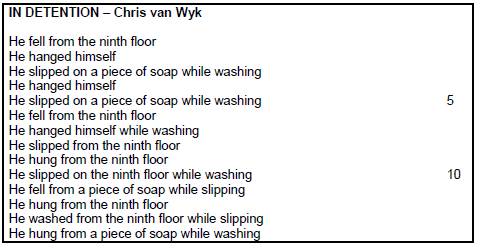
This poem exposes the abuse of power by police in apartheid South Africa.
By close reference to the structure, diction and tone of the poem, critically discuss the validity of this statement.
Your response should take the form of a well-constructed essay of 250–300 words (about ONE page).
[10]
QUESTION 2: POETRY – CONTEXTUAL QUESTION
2.1 How does the title evoke sympathy for the infant? (2)
2.2 Explain how the word, 'Scavenging' (line 9), contributes to the reader's understanding of life in White City Jabavu. (2)
2.3 Refer to lines 20–21: 'sleep well/on human dung.'
Discuss how the tone in these lines reflects the speaker's attitude toward the infant's plight. (3)
2.4 The speaker blames the society created by apartheid for the death of this infant.
To what extent do you agree with the above statement? Justify your response with reference to the poem as a whole. (3)
[10]
QUESTION 3: POETRY – CONTEXTUAL QUESTION
Read the poem below and then answer the questions that follow.
3.1 Suggest a reason for the speaker's describing his brain as 'teeming' (line 2). (2)
3.2 Explain what the word, 'shadows' (line 8) implies about the creative process. (2)
3.3 Refer to lines 11–12: 'Never have relish in the faery power/Of unreflecting love'.
Comment on how the tone in these lines reflects the speaker's attitude. (3)
3.4 Despite the speaker's fears, the sonnet offers a hopeful resolution.
To what extent do you agree with the above statement? Justify your response with reference to the poem as a whole. (3)
[10]
QUESTION 4: POETRY – CONTEXTUAL QUESTION
Read the poem below and then answer the questions that follow.
4.1 Refer to line 13: 'donned impersonality'.
What does this description of the bikers suggest about them? (2)
4.2 Refer to line 16: 'And almost hear a meaning in their noise.'
What does the inclusion of the word, 'almost' contribute to your understanding of the bikers' state of mind? (2)
4.3 Refer to lines 28–29: 'one wakes/Afloat on movement that divides and breaks.'
Comment on the appropriateness of this imagery in the context of the poem as a whole. (3)
4.4 Line 31, 'both hurler and the hurled', suggests that there is something complex about the human condition.
To what extent do you agree with the above statement? Justify your response with reference to the poem as a whole. (3)
[10]
AND
UNSEEN POETRY (COMPULSORY)
QUESTION 5: UNSEEN POETRY – CONTEXTUAL QUESTION
Read the poem below and then answer the questions that follow.
Glossary:
- subway1 – underground railway line
- caskets2 – coffins
- gargoyles3 – sculptures of monstrous creatures
5.1 Refer to lines 1–2: 'I walked down … of a subway'.
What impression of the subway is created in these lines? (2)
5.2 How do the words, 'zombies and gargoyles' (line 6) contribute to the mood of stanza 1? (2)
5.3 Is the reference to 'graffiti artists' (line 7) in keeping with the rest of the poem? Justify your response. (3)
5.4 Critically discuss how the words, 'caskets' (line 3), 'tombstones' (line 12) and 'cemetery' (line 13) contribute to the central idea of the poem. (3)
[10]
TOTAL SECTION A: 30
SECTION B: NOVEL
Answer ONLY on the novel you have studied.
ANIMAL FARM – George Orwell
Answer EITHER QUESTION 6 (essay question) OR QUESTION 7 (contextual question).
QUESTION 6: ANIMAL FARM – ESSAY QUESTION
Morality can fall victim to personal ambition, selfishness and hypocrisy.
Assess the validity of the above statement in relation to Animal Farm.
Your response should take the form of a well-constructed essay of 400–450 words (2–2½ pages).
[25]
QUESTION 7: ANIMAL FARM – CONTEXTUAL QUESTION
Read the extracts below and then answer the questions that follow.
EXTRACT A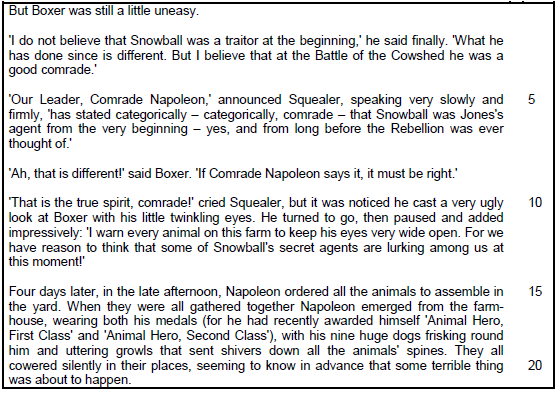

7.1 Refer to lines 2–4: 'I do not believe ... a good comrade.'
Account for Boxer's assertion in the above lines. (3)
7.2 Refer to lines 10–11: 'it was noticed … little twinkling eyes.'
Explain Squealer's reaction to Boxer in these lines. (3)
7.3 Discuss the significance of Napoleon's awarding himself the 'Animal Hero, First Class' and 'Animal Hero, Second Class' (lines 17–18) medals. (3)
7.4 Refer to line 26: 'Napoleon now called upon them to confess their crimes.'
Comment on Napoleon's desire for the animals to confess. (3)
AND
EXTRACT B
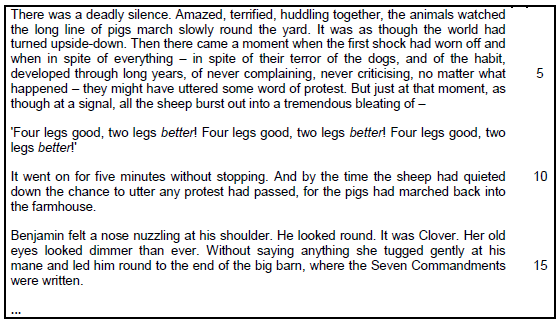

7.5 Refer to line 7: 'all the sheep burst out into a tremendous bleating'.
Discuss the specific role of the sheep both in this extract and in the novel as a whole. (3)
7.6 Refer to line 18: 'For once Benjamin consented to break his rule'.
Discuss the irony of Benjamin's decision 'to break his rule'. (3)
7.7 Refer to line 19: 'There was nothing there now except a single Commandment.'
Comment on the significance of the change to 'a single Commandment'. (3)
7.8 'The most powerful weapon in the hands of the oppressor is the mind of the oppressed.'
Using material from EXTRACT A and EXTRACT B as a starting point, critically discuss the extent to which this quotation is relevant to Animal Farm. (4)
[25]
PRIDE AND PREJUDICE – Jane Austen
Answer EITHER QUESTION 8 (essay question) OR QUESTION 9 (contextual question).
QUESTION 8: PRIDE AND PREJUDICE – ESSAY QUESTION
Morality can fall victim to personal ambition, selfishness and hypocrisy.
Assess the validity of the above statement in relation to Pride and Prejudice.
Your response should take the form of a well-constructed essay of 400–450 words (2–2½ pages).
[25]
QUESTION 9: PRIDE AND PREJUDICE – CONTEXTUAL QUESTION
Read the extracts below and then answer the questions that follow.
EXTRACT C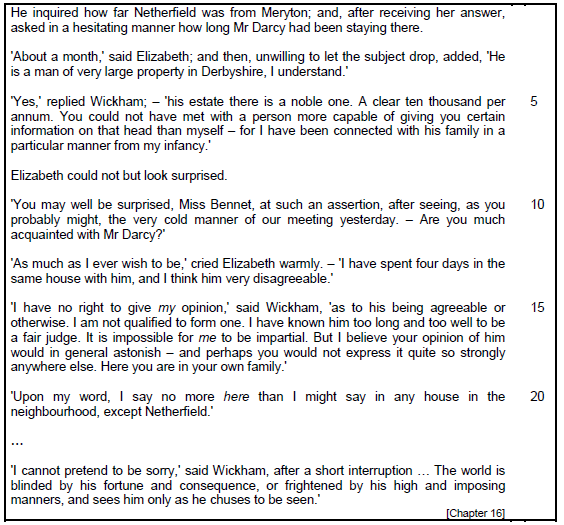
9.1 Account for Elizabeth's unwillingness to let the subject of Mr Darcy drop (line 3). (3)
9.2 Refer to lines 13–14: 'As much as I ever … him very disagreeable.'
Is Elizabeth's attitude toward Darcy in these lines consistent with her character? Substantiate your answer. (3)
9.3 Refer to lines 15–16: 'I have no right … to form one.'
Comment, in the context of the paragraph as a whole, on the significance of Wickham's remarks in these lines. (3)
9.4 Refer to line 24: 'and sees him only as he chuses to be seen.'
Discuss the irony in Wickham's statement. (3)
AND
EXTRACT D
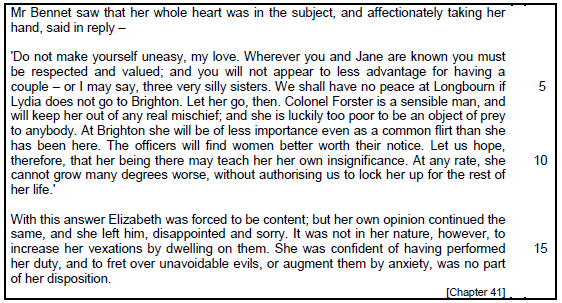
9.5 Explain how this extract reveals Mr Bennet's attitude toward his daughters. (3)
9.6 Refer to lines 5–6: 'We shall have … Let her go, then.'
Discuss how Lydia's behaviour in Brighton is likely to have an impact on her family. (3)
9.7 Comment on what EXTRACT D suggests about Austen's society. (3)
9.8 The issue of morality is central to the novel.
Using material from EXTRACT C and EXTRACT D as a starting point, critically discuss the extent to which this statement is relevant to Pride and Prejudice. (4)
[25]
THE GREAT GATSBY – F Scott Fitzgerald
Answer EITHER QUESTION 10 (essay question) OR QUESTION 11 (contextual question).
QUESTION 10: THE GREAT GATSBY – ESSAY QUESTION
Morality can fall victim to personal ambition, selfishness and hypocrisy.
Assess the validity of the above statement in relation to The Great Gatsby.
Your response should take the form of a well-constructed essay of 400–450 words (2–2½ pages).
[25]
QUESTION 11: THE GREAT GATSBY – CONTEXTUAL QUESTION
Read the extracts below and then answer the questions that follow.
EXTRACT E
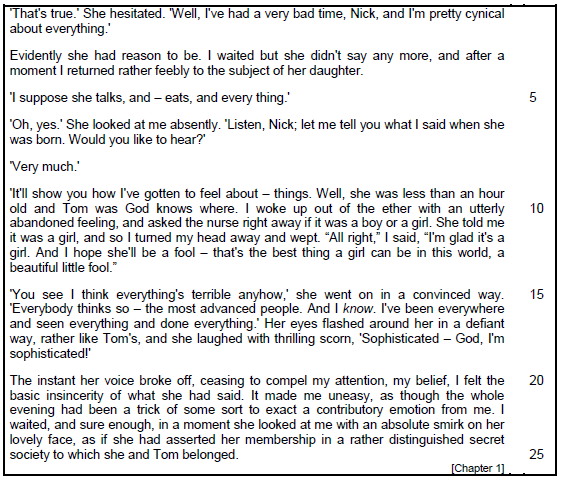
11.1 Refer to lines 1–2: 'Well, I've had … cynical about everything.'
Account for Daisy's cynical attitude to life. (3)
11.2 Refer to lines 3–6: 'after a moment … at me absently.'
With reference to the novel as a whole, describe what these lines reveal about Daisy's relationship with her child. (3)
11.3 Refer to line 10: 'Tom was God knows where.'
Discuss whether Tom's behaviour as described in this line is typical of him. (3)
11.4 Refer to lines 20–22: 'The instant her … emotion from me.'
Comment on Nick's reaction to Daisy's speech. (3)
AND
EXTRACT F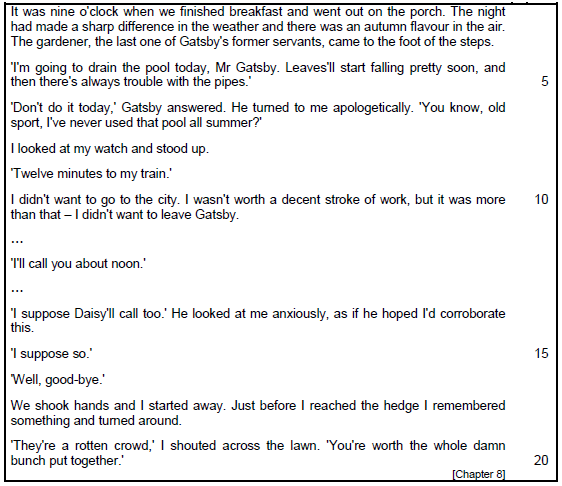
11.5 Refer to lines 10–11: 'I didn't want … to leave Gatsby.'
Account for Nick's reluctance to leave Gatsby. (3)
11.6 Refer to line 13: 'I suppose Daisy'll call too.'
Discuss the irony of Gatsby's comment. (3)
11.7 Refer to line 2: 'there was an autumn flavour in the air.'
Comment on the significance of the reference to the season in the wider context of the novel. (3)
11.8 Refer to lines 19–20: 'They're a rotten … bunch put together.'
Using material from EXTRACT E and EXTRACT F as a starting point, critically discuss the validity of Nick's comment in the context of the novel as a whole.
(4)
[25]
TOTAL SECTION B: 25
AND
SECTION C: DRAMA
Answer ONLY on the play you have studied.
OTHELLO – William Shakespeare
Answer EITHER QUESTION 12 (essay question) OR QUESTION 13 (contextual question).
QUESTION 12: OTHELLO – ESSAY QUESTION
The characters in Othello are driven by self-interest rather than concern for others.
Critically discuss the extent to which you agree with the above statement.
Your response should take the form of a well-constructed essay of 400–450 words (2–2½ pages).
[25]
QUESTION 13: OTHELLO – CONTEXTUAL QUESTION
Read the extracts below and then answer the questions that follow.
EXTRACT G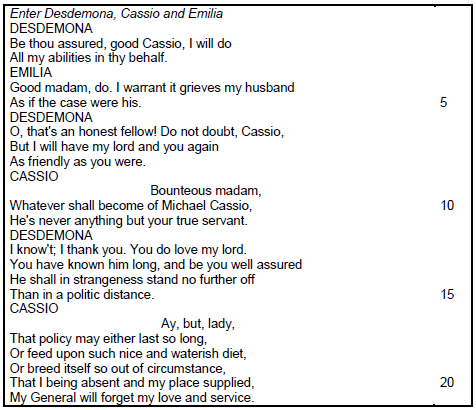
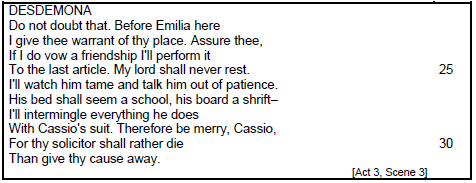
13.1 Explain how Cassio's appeal to Desdemona will promote Iago's plans. (3)
13.2 Refer to lines 24–25: 'If I do vow … the last article.'
How are Desdemona's words in keeping with what we know of her up to this point in the play? (3)
13.3 Refer to lines 29–31: 'be merry, Cassio … thy cause away.'
Discuss what is ironic about Desdemona's statement. (3)
AND
EXTRACT H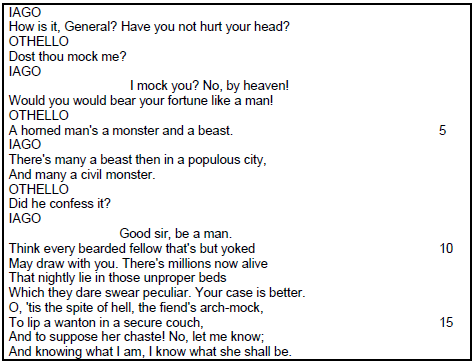
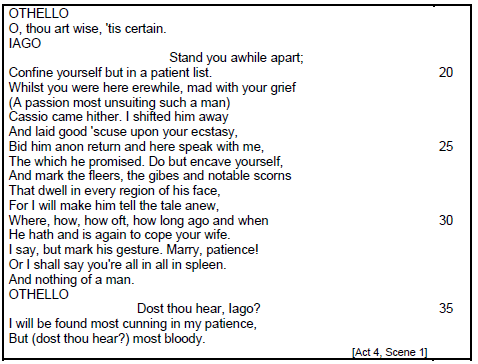
13.4 Refer to lines 1–5: 'How is it … and a beast.'
Account for Othello's sensitivity at this stage in the play. (3)
13.5 Examine lines 14–17: 'O, 'tis the spite … she shall be.'
Discuss how the language used in these lines conveys Iago's attitude toward women. (3)
13.6 Refer to lines 19–32: 'Stand you awhile ... Marry, patience!'
Comment on the effect that Iago's speech will have on Othello's perception of Iago. (3)
13.7 Since the beginning of the play, there has been a change in Iago's tone when addressing Othello.
Discuss the significance of this change. (3)
13.8 Refer to lines 35–37: 'Dost thou hear … most bloody.'
Critically discuss, in the context of the play as a whole, how these lines influence your attitude to Othello. (4)
[25]
THE CRUCIBLE – Arthur Miller
Answer EITHER QUESTION 14 (essay question) OR QUESTION 15 (contextual question).
QUESTION 14: THE CRUCIBLE – ESSAY QUESTION
The characters in The Crucible are driven by self-interest rather than concern for others.
Critically discuss the extent to which you agree with the above statement.
Your response should take the form of a well-constructed essay of 400–450 words (2–2½ pages).
[25]
QUESTION 15: THE CRUCIBLE – CONTEXTUAL QUESTION
EXTRACT I
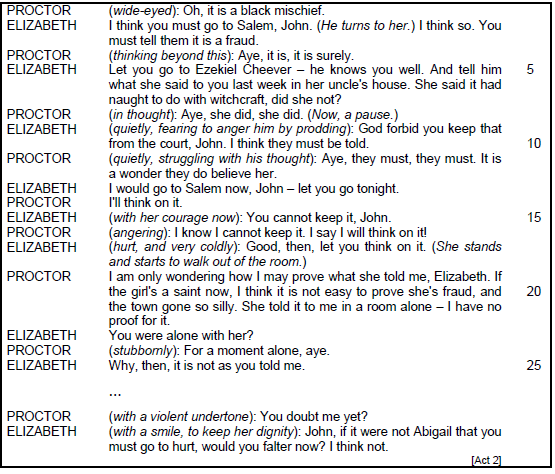
15.1 Refer to line 2: 'I think you must go to Salem, John.'
Account for Elizabeth's insistence that Proctor go to Salem. (3)
15.2 Suggest reasons for Proctor's 'thinking beyond this' (line 4). (3)
15.3 Refer to line 1: 'Oh, it is a black mischief.'
Discuss the accuracy of Proctor's assessment in the context of the play as a whole. (3)
15.4 Comment on the irony of Proctor's referring to Abigail as 'a saint now' (line 20). (3)
15.5 Refer to line 26: 'You doubt me yet?'
In your view, is Proctor's sensitivity justified? Substantiate your response. (3)
AND
EXTRACT J
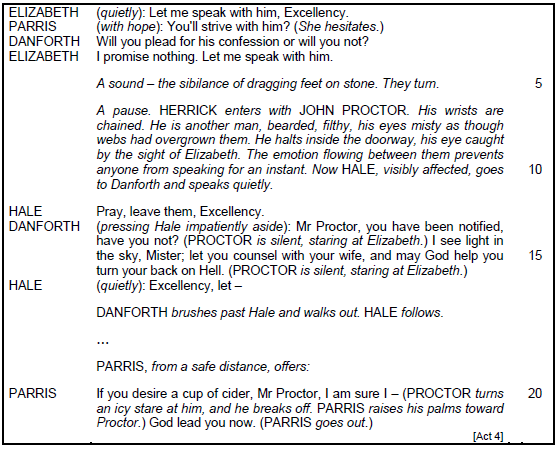
15.6 Refer to line 2: '(with hope) You'll strive with him?'
Account for Parris's feeling of 'hope' at this stage of the play. (3)
15.7 Refer to lines 13–16: 'Mr Proctor, you have … back on Hell.'
Comment on Danforth's tone in these lines. (3)
15.8 Refer to the following lines:
'Now HALE, visibly affected, goes to Danforth and speaks quietly.' (lines 10–11)
'HALE Pray, leave them, Excellency.' (line 12)
'HALE (quietly): Excellency, let –' (line 17)
Critically discuss, in the context of the play as a whole, how these lines influence your attitude to Hale.
(4)
[25]
TOTAL SECTION C:25
GRAND TOTAL:80